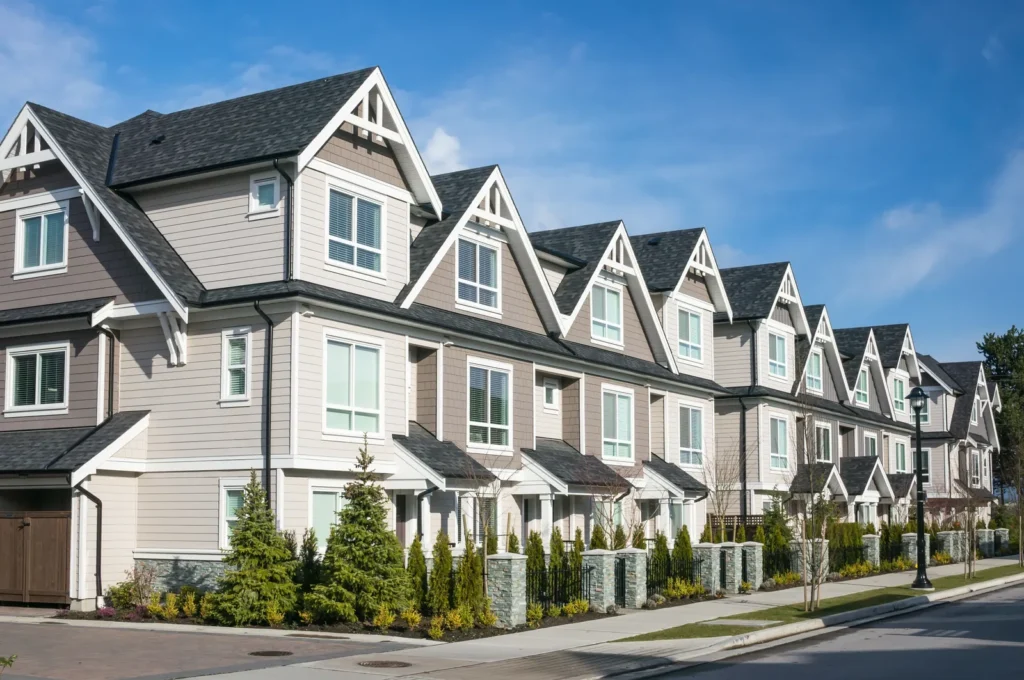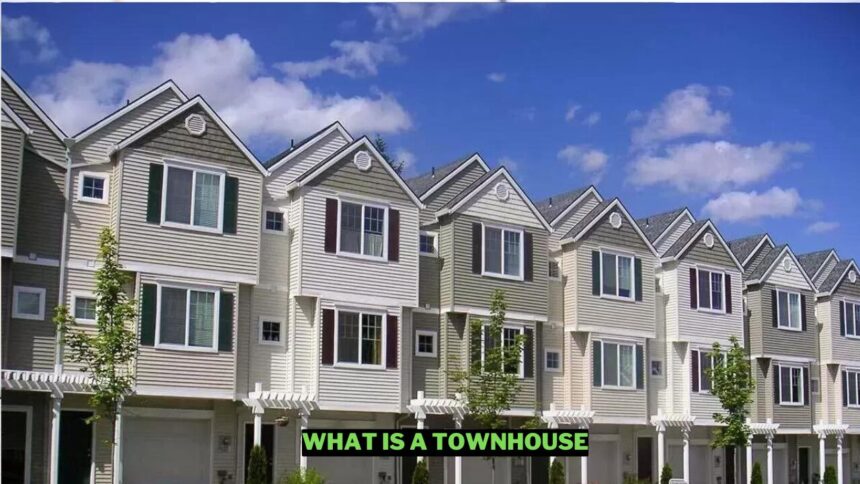When you’re in the process of buying a home, you’ll come across various housing options, one of which is a townhouse.
Townhomes are generally more budget-friendly compared to standalone single-family homes. If you’re comfortable with having shared walls with your neighbors, a townhouse could be a suitable choice for you and your family.
In this article, we’ll explore what exactly a townhouse is, how it differs from other types of homes, and the advantages and disadvantages it offers.
You Might Also Like:
What Is a Townhouse?

A townhouse, also known as a townhome, is a type of residential unit that is typically part of a row of houses. It consists of at least two floors and is connected to another unit on one or both sides, sharing one or two walls.
In addition to this, townhouses may also have shared yards and amenities, but they usually have their own separate entrance. Compared to traditional single-family homes, townhouses are generally smaller in size.
A townhouse is a type of residential property that is not considered as such unless it is physically connected to another unit. Unlike standalone homes, townhouses are usually part of a row of attached units. It is important to note that each townhouse unit is privately owned and may be subject to the regulations and fees of a homeowners association (HOA).
Townhomes Vs. Other Types Of Homes
When individuals are in the process of purchasing a townhouse, they often wonder how it differs from a rowhome, apartment, condominium, or detached single-family home. Understanding the distinctions between these various types of homes is essential.
Townhouse Vs. Rowhouse
Townhouses are often known as rowhouses, although there is a distinction between the two. When we mention “rowhouse,” it suggests that the building is exactly the same as its neighboring structures. On the other hand, townhomes can have different designs even if they are part of the same townhouse complex.
Townhouses and rowhouses are both types of residential buildings, but there are some key differences between them. Rowhouses are commonly found in urban areas, while townhomes are often located in the suburbs.
Rowhomes are usually constructed in long rows that can span an entire street or block. On the other hand, townhomes can also be built in rows, but they are more likely to be divided into smaller sections or groups.
Townhouse Vs. Apartment
A townhouse is a type of housing that has similarities to apartments. It is a separate dwelling located within a larger complex. Similar to apartment buildings, townhouse complexes often offer residents shared facilities and amenities such as a gym or outdoor space.
A townhouse is distinct from an apartment as it is usually bought by the owner instead of being rented out to tenants. Unlike apartments, renters typically do not have the opportunity to purchase their own unit.
Additionally, apartments are usually managed and maintained by a landlord or property manager. In contrast, the owner of a townhouse is responsible for the upkeep and repairs of the property, as well as adhering to any guidelines set by the Homeowners Association (HOA).
Townhouse Vs. Condo
Townhouses and condominiums (condos) share many similarities. Both types of housing units are often connected to other units by one or two walls and are usually managed by a homeowners association (HOA). Moreover, residents of both townhouses and condos typically enjoy the use of community amenities.
A townhouse is a type of housing that shares walls with one or two other homes, while condos are individual units within a larger complex. Unlike townhomes, condos often have neighbors living above or below them, making townhomes generally more private.
A townhouse is a type of housing unit that offers residents more flexibility and control over their property compared to a condominium.
While condo owners may have limited control over the exterior of their unit due to the Homeowners Association (HOA) rules, townhouse owners have the freedom to make changes and modifications to the exterior of their space.
Additionally, while condo complexes often handle yard maintenance, townhouse HOAs may require owners to assume responsibility for outdoor tasks.
Townhouse Vs. Detached Single-Family Home
A townhouse is a type of residential property that falls under the category of single-family dwellings. Both townhouses and single-family homes require owners to be responsible for the upkeep of both the interior and exterior of the property.
However, unlike a traditional single-family home, a townhouse combines elements of both a single-family home and a condominium. This makes it an appealing option for individuals seeking a balance between the two in the real estate market.
A townhouse is a housing option that offers reduced maintenance and upkeep compared to single-family homes. While not all townhouses are part of a homeowners association (HOA), many are, and some HOAs handle tasks such as snow removal and landscaping maintenance.
Owning a townhouse can be a smart choice for individuals seeking the convenience of a single-family home without the burden of maintenance responsibilities. A townhouse is a type of housing that is typically located in urban or suburban areas.
Unlike single-family homes, which can be found in more rural locations, townhouses are often newer and have been more recently renovated or updated.
How To Buy A Townhouse: 5 Steps
When it comes to purchasing a townhouse, the buying process is quite similar to buying a regular house. However, there are a few extra factors to keep in mind. Follow these steps to find the ideal townhome for your needs:
1. Calculate Your Housing Budget
The price of purchasing a townhouse can differ based on various elements such as its location, size, and amenities. It is important to note that townhouses are usually governed by a homeowners association, which may require an additional monthly fee.
Prior to beginning your search for a home, it is advisable to determine your budget for the total purchase price and monthly mortgage payment. It is essential not to overlook other costs such as the down payment and closing costs.
2. Determine Where You Want To Live
After setting your housing budget, you can utilize this allocated amount to assess your affordability for different residential areas. Generally, townhouses are situated in suburban and urban regions, resulting in higher living costs compared to rural areas.
Additionally, this step helps you decide whether you prefer residing in a townhome community associated with a Homeowners Association (HOA). Depending on individual preferences, some buyers may opt out of this lifestyle to enjoy more autonomy and avoid monthly fees.
3. Find A Mortgage Lender
Before making an offer on a townhouse, it is advisable to obtain preapproval for a mortgage. This involves obtaining an approval letter from a mortgage lender, which helps solidify your house budget and demonstrates to sellers that you have the financial capability to complete the transaction.
It is also beneficial to compare various types of mortgages to find the most suitable home loan for your specific requirements. For instance, if you are a first-time homebuyer, you might want to consider an FHA loan, as it has less strict financial criteria compared to other mortgage options.
On the other hand, if you have a strong credit score, a conventional loan may be a viable choice. Conventional mortgage loans typically necessitate a down payment ranging from 3% to 20%.
4. Make An Offer
Once you have received a mortgage approval letter, you can begin visiting townhouses in the neighborhoods you are interested in. It’s important to note that various communities may provide different amenities. Before making an offer on a home, be sure to carefully compare the expenses and advantages of each property.
5. Close On The Home
Once the seller accepts your offer, you can ease your mind and let your lender handle the rest. Over the next few weeks, the house will undergo an appraisal, and if you have added a home inspection contingency, it will be inspected as well.
However, it is important to stay in touch with your loan officer in case they require any additional information to address any concerns raised by the underwriter. Ultimately, it will be up to your lender to make the final determination on approving the mortgage, allowing you to proceed with the closing process and acquire your new home.
How Much Does a Townhouse Cost?
Townhouses are usually priced lower than single-family homes, but that doesn’t imply they are inexpensive. In certain cases, a townhouse in Brooklyn may be more costly than a single-family home in Dallas. The cost of a townhouse is determined by various factors such as:
- Location
- Size
- Market demand
- HOA costs (if applicable)
- Financing options
- Included amenities
Should I rent or buy a townhouse?
When deciding between renting or buying a townhouse, it’s important to weigh the advantages and disadvantages, just like you would with a traditional home.
Take into account your budget, the amount you can put towards a down payment, the length of time you plan to stay, and whether you can handle any necessary maintenance on your own.
Ultimately, your housing requirements will determine whether renting or owning is the better option. Keep in mind that buying a home is a bigger commitment than renting, so it’s crucial to carefully evaluate your situation.
What are the best areas for a townhouse?
The ideal location to purchase a townhouse varies depending on the individual buyer. It is important to assess your personal preferences and requirements in a home.
Are you interested in residing near vibrant city areas or would you prefer a more tranquil, family-friendly neighborhood? Additionally, it is crucial to consider the growth potential of an area.
If a neighborhood is experiencing rapid expansion, it is possible to accumulate home equity at a faster rate.
This could potentially allow you to sell your property earlier or at a higher price compared to someone residing in an older neighborhood without any new developments.
Townhouse Pros and Cons
Here are some of the pros and cons of living in a townhouse.
Pros of Living in a Townhouse
- Cost
- A townhouse is typically more affordable than a standalone house, with the cost varying based on the area. It presents an excellent opportunity for individuals who are purchasing a home for the first time, as it allows them to acquire a property at a reduced price and begin accumulating equity.
- Financing
- The process of obtaining financing for a townhouse is similar to getting a mortgage for a standalone house. Townhomes can also be eligible for government-backed home loans, such as those offered by the Federal Housing Administration, Department of Veterans Affairs, and the U.S. Department of Agriculture.
- Amenities
- A townhouse is a type of residential property that offers shared amenities to its residents. These amenities can range from a clubhouse, a gym, a pool, and other communal facilities that are enjoyed by
- Maintenance
- A townhouse is a type of property where the owners have a greater responsibility for maintaining and taking care of their units. This includes both the inside and outside of the townhouse. Tasks like landscaping, fixing the roof, and upkeep of private outdoor areas fall under the responsibility of the townhome owners. However, certain maintenance aspects like structural issues may be covered by the Homeowners Association (HOA).
Cons of Living in a Townhouse
- HOA
- A townhouse is a type of residential property that is usually part of a homeowners association (HOA). The HOA is responsible for managing and maintaining certain aspects of the property, but this also means that homeowners have to pay fees and abide by certain rules and restrictions. These fees can vary greatly, ranging from $100 to several thousand dollars per month.
- Less privacy
- A townhouse is a type of residential property that is connected to other houses, sharing walls. Due to this close proximity, privacy may be compromised compared to living in a detached single-family home. Additionally, there is a higher likelihood of being able to hear noises from neighbors through the shared walls.
- Multiple levels
- Townhouses are homes that consist of multiple levels, which can pose difficulties for older individuals or people with limited mobility.
- Smaller space
- A townhouse is a type of residential property that typically consists of multiple floors and is usually larger in size compared to apartments. However, townhouses generally remain smaller in size when compared.
The Bottom Line
When purchasing a townhouse, there are several advantages for home buyers, as it allows them to accumulate equity without the same level of property maintenance responsibilities. Nonetheless, it is crucial to thoroughly explore various house buying options before reaching a final decision.





